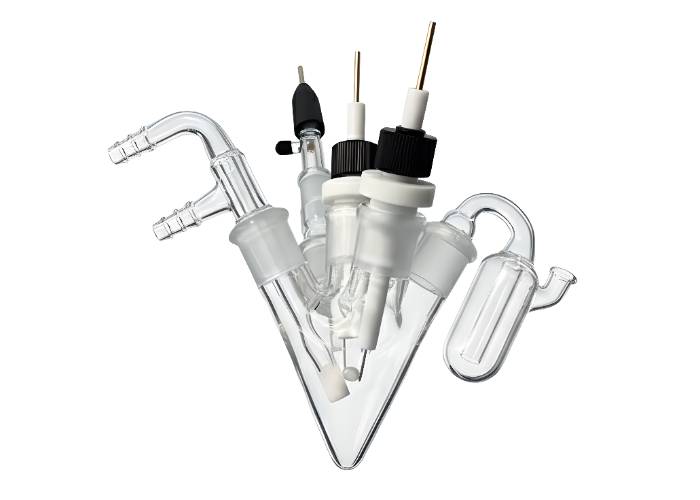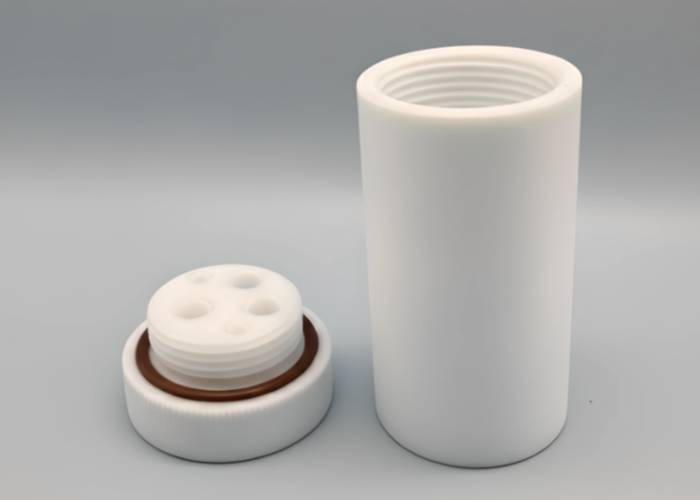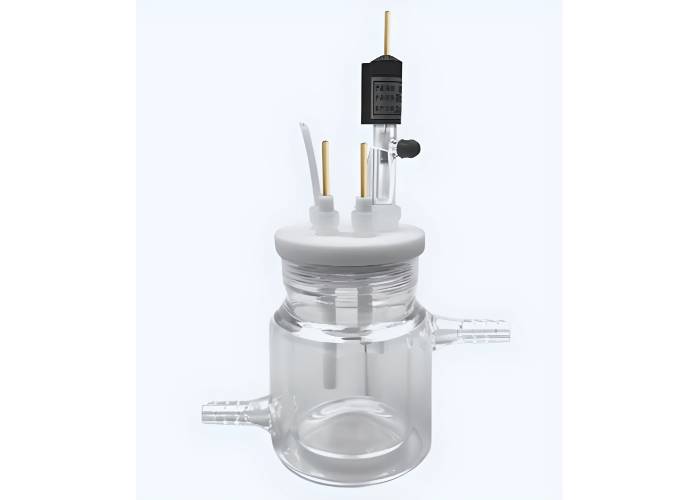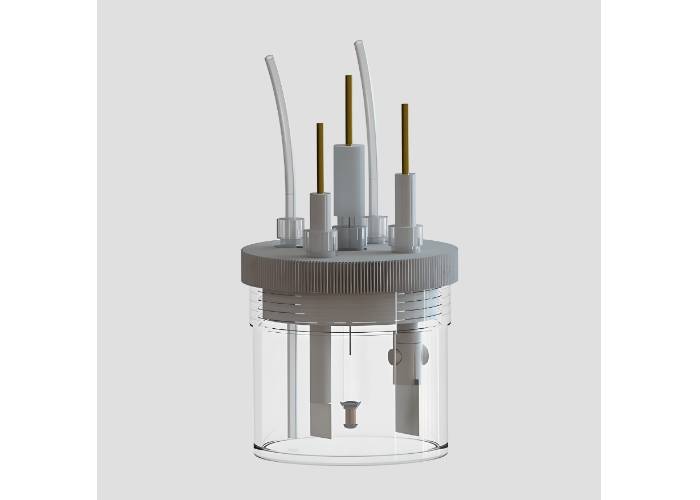Electrochemical Cell
Complete electrochemical cells with customizable electrode holders and compartments for studies in sensors, batteries, electrocatalysis, and corrosion. Ideal for labs.

Glass Electrochemical Cell, unsealed

Small-Volume Conical Three-Electrode Electrochemical Cell

PTFE Electrochemical cell - Inert reactor


5-Port Electrolytic Cell

Jacketed 5-Port Electrolytic Cell
Electrochemical Cell: Complete Guide for Research and Laboratory Applications
Electrochemical cells are essential laboratory tools for studying a wide range of electrochemical phenomena, including sensors, batteries, corrosion, and electrocatalysis. These versatile systems allow researchers to investigate charge transfer reactions, electrode behavior, and electrolyte properties with high precision. By offering customizable electrode holders and various compartment designs, modern electrochemical cells have become indispensable in fields such as materials science, electrochemistry, energy storage, and advanced sensor technology.
This guide explores the principles, applications, and different product families of electrochemical cells. Whether you are working on next-generation battery materials, evaluating corrosion resistance, or developing new electrocatalysts, understanding the right type of electrochemical cell is critical for reliable and reproducible results.
What is an Electrochemical Cell?
An electrochemical cell is a device that converts chemical energy into electrical energy, or vice versa, through redox (reduction-oxidation) reactions. These cells consist of electrodes immersed in an electrolyte, where electric current is generated or consumed depending on the experimental setup.
Electrochemical cells are typically categorized into:
-
Galvanic (Voltaic) cells – which produce electric current from chemical reactions (used in batteries).
-
Electrolytic cells – which drive chemical reactions using an external power source (used in electrolysis, electropolishing, or materials deposition).
In laboratory settings, electrochemical cells are highly specialized, often designed with multiple ports, glass or jacketed compartments, and sealed configurations to ensure controlled and reproducible experiments.
There are two main types of electrochemical cells, each with differently charged anodes and cathodes. In a galvanic cell, a salt bridge links the two electrodes, allowing ion flow. A voltmeter is then used to measure the electrical current generated by the spontaneous chemical reaction.
Applications of Electrochemical Cells
Electrochemical cells are employed in diverse scientific and industrial applications:
-
Battery Research
-
Evaluate electrode materials for lithium-ion, sodium-ion, and other next-generation batteries.
-
Study charge-discharge behavior and cycle stability.
-
-
Electrocatalysis Studies
-
Investigate catalysts for hydrogen evolution, oxygen reduction, or CO2 reduction.
-
Measure catalytic efficiency, overpotential, and stability under reaction conditions.
-
-
Corrosion Testing
-
Simulate corrosive environments to assess material degradation.
-
Enable accelerated studies of coatings, inhibitors, and alloys.
-
-
Sensor Development
-
Test performance of biosensors, gas sensors, and electrochemical sensors.
-
Study sensitivity, response time, and selectivity.
-
-
Fundamental Electrochemistry Research
-
Explore electrode kinetics, diffusion properties, and redox mechanisms.
-
Conduct three-electrode measurements with reference, working, and counter electrodes.
-
Product Families of Electrochemical Cells
Laboratories require different configurations of electrochemical cells depending on the experiment. Below are the most common product families available for advanced research:
1. Sealed Electrochemical Cell
-
Designed to prevent contamination and evaporation, ensuring a controlled environment for sensitive electrochemical experiments.
-
Suitable for air-sensitive materials, long-duration studies, and high-purity electrolyte conditions.
-
Commonly used in battery research and corrosion testing, where maintaining the integrity of the sample is critical.
Key Benefits:
-
Leak-proof design
-
Maintains stable electrolyte composition
-
Ideal for long-term measurements
2. Glass Electrochemical Cell (Unsealed)
-
A traditional electrochemical cell made of borosilicate glass provides versatility for general electrochemistry experiments.
-
An open structure allows easy access for electrode positioning, electrolyte replacement, and cleaning.
-
Cost-effective and widely used in academic settings for routine educational experiments and standard laboratory studies.
Key Benefits:
-
Easy to use and clean
-
Flexible for multiple electrode configurations
-
Affordable and robust
3. Jacketed Sealed Glass Cell
-
Combines the properties of a sealed cell with a temperature control jacket.
-
The double-walled design allows circulation of thermostated fluid, enabling accurate temperature-dependent investigations.
-
Perfect for thermodynamic studies, electrokinetic experiments, and battery performance evaluations under controlled thermal conditions.
Key Benefits:
-
Temperature regulation for precise experiments
-
Leak-proof sealing
-
Compatible with advanced research applications
4. Jacketed 5-Port Electrolytic Cell
-
A versatile 5-port cell with temperature control capability due to jacketed construction.
-
The multiple ports allow insertion of working, counter, and reference electrodes, gas purging tubes, and sampling probes.
-
Widely used in multi-stage catalytic studies, advanced corrosion testing, and simultaneous electrode measurements.
Key Benefits:
-
Supports complex experimental configurations
-
Built-in temperature control
-
Facilitates multi-electrode monitoring
5. 5-Port Electrolytic Cell (Standard)
-
Designed with five access ports for specialized electrochemical experiments.
-
Non-jacketed version for setups where room temperature or external thermal insulation is sufficient.
-
Popular in kinetics analyses, multi-channel sensing, and electrocatalytic mechanism studies where multiple electrodes need to be positioned simultaneously.
Key Benefits:
-
Accommodates advanced experimental setups
-
Space-efficient and flexible
-
Suitable for academic and industrial use
Choosing the Right Electrochemical Cell
Selecting the correct cell depends on:
-
Research Type: For corrosion, sealed cells are preferred; for general electrochemistry, glass cells work well.
-
Temperature Sensitivity: Jacketed cells allow for precise temperature control in thermodynamic studies.
-
Complexity of Setup: 5-port cells support multiple simultaneous measurements.
-
Experiment Duration: Sealed options are better for long-term stability studies.
Advantages of Using Customizable Electrochemical Cells
-
Flexibility in electrode placement for different research needs.
-
Durability and material compatibility with aggressive electrolytes.
-
Temperature and environmental control with sealed or jacketed configurations.
-
Scalability for both academic and industrial research setups.
Need Help Choosing the Right Electrochemical Cell?
Our expert team is here to help you select the perfect electrochemical cell for your research needs. Whether your work involves battery testing, electrocatalysis, corrosion studies, or sensor development, we have the ideal solution tailored for you.
Request Expert Advice
FAQs About Electrochemical Cells
Q1. What is the purpose of a three-electrode electrochemical cell?
A three-electrode cell includes a working electrode, a counter electrode, and a reference electrode. This configuration helps achieve precise control of electrode potential, ensuring accurate electrochemical measurements.
Q2. Why are sealed electrochemical cells important?
Sealed cells prevent evaporation, air contamination, and unwanted reactions. They are critical when studying air-sensitive compounds, long-duration electrolysis, or advanced battery materials.
Q3. What is the role of a jacketed electrochemical cell?
Jacketed cells allow circulation of thermostated fluid for temperature control. This is essential in studies involving kinetics, reaction mechanisms, and temperature-dependent electrochemical behavior.
Q4. How does a 5-port cell improve experimental flexibility?
A 5-port design enables multiple electrodes and accessories (like gas inlets and sampling probes) to be inserted simultaneously, making it ideal for multi-parameter electrochemical analysis.
Q5. Can electrochemical cells be customized for research?
Yes, many manufacturers provide customizable electrode holders, compartments, and sealing options, allowing researchers to tailor the setup to their experiment.
Q6. Which electrochemical cell is best for corrosion studies?
Sealed cells are often used because they maintain stable electrolyte conditions and prevent contamination, ensuring accurate corrosion rate measurements.
Q7. Are glass electrochemical cells reusable?
Yes, glass cells are durable and reusable with proper cleaning, making them cost-effective for general laboratory use.

